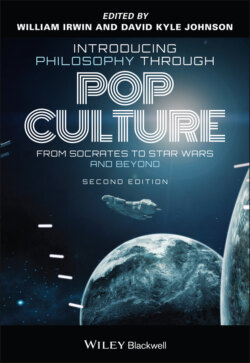Читать книгу Introducing Philosophy Through Pop Culture - Группа авторов - Страница 44
What's the Harm, Dude?
ОглавлениеThose who can make you believe absurdities can make you commit atrocities.
– Voltaire
Maybe Pascal's Wager doesn't show us that we should believe in God, but still, we might ask, what's the harm? Perhaps we should only have beliefs based on reasons, but what's wrong with prudential reasons? In “All About Mormons” Gary tells Stan, “Maybe us Mormons do believe in crazy stories that make absolutely no sense. And maybe Joseph Smith did make it all up. But I have a great life and a great family, and I have the Book of Mormon to thank for that. The truth is, I don't care if Joseph Smith made it all up.” And in “The Biggest Douche in the Universe” John Edward tries to defend himself to Stan when he says, “What I do doesn't hurt anybody. I give people closure and help them cope with life.” So, echoing Gary, Stan's Mormon friend, we could similarly say we don't care if Edward is a fraud, as long as what he does makes people feel good. Again, what's the harm?
But this is only part of the story. For one, as we've already seen, unsupported beliefs can lead to harmful consequences. In “Timmy 2000,” the belief that Timmy has ADD (that he does not have learning disabilities) eventually causes a wild spread of unnecessary prescription drugs and, worse, a belief that the music of Phil Collins is actually good. In “Super Best Friends” some of the followers of magician David Blaine blindly follow him and commit suicide, believing they will go to heaven. In both of these cases, the believers feel good about their beliefs; they provide hope or comfort. But they're still extremely dangerous.
A second sort of harm here is mental weakness and laziness. As Clifford said, “Every time we let ourselves believe for unworthy reasons, we weaken our powers of self‐control, of doubting, of judicially and fairly weighing evidence.” His point is that even if a person's unsupported belief causes no immediate harm (as in the examples from South Park), it weakens the mind. Stan's dad even gives himself cancer so he can get medicinal marijuana (“Medicinal Fried Chicken”), and like him, we get used to accepting ideas uncritically, growing mentally lazy, and this encourages others to do the same. Just like Randy Marsh, most of the citizens of South Park rarely use their critical faculties. This makes them easy prey for every cult, fad, or con that comes to town. Think of just about any episode of South Park, and you'll find many examples of this mental weakness and laziness.
